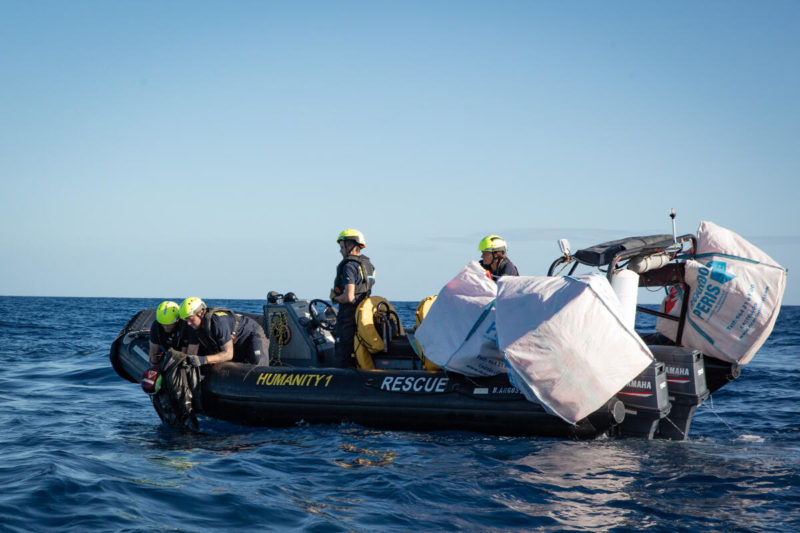Blog from aboard 03

“Person overboard!” This situation also needs to be practised. Trainings take place at sea and on the way to the rescue area. Press officer Petra reports directly from Humanity 1.
Sunday, 16 October 2022, Mediterranean
We are at sea! We left Palermo on Friday afternoon, 14th October, and have been on our way to the search and rescue region since. Strong winds and high swells have caused nausea among some of the crew. On Friday evening, almost no one is to be found in the mess. After drinking my ginger tea which is supposed to help against seasickness, I also go to bed early – and sleep surprisingly well, despite or because of the intense rocking.
The next morning, another RHIB training is a new experience for me due to the weather. After the two speedboats, each with the driver and two members of the search and rescue (SAR) team, are lowered into the water by the crane, I join “Bravo” from the mother ship. From the deck I take the hanging board ladder climbing down backwards into to the RHIB with the full rescue equipment: helmet, water-repellent dungarees, safety shoes, life jacket (which inflates on contact with water) and radio. As there is nothing to hold on while descending, two crew members hold my hands and arms and lower me down while my feet search the rungs of the ladder. The speedboat is constantly in motion, up and down.
When it’s roaring off, we all hold on tightly, because the heavy swell makes the RHIB hit the waves hard. Further out, we throw a 70-kg-dummy, “Oscar”, into the water. “Person over board!” After a short round, we head for Oscar. Lying on our bellies over the side of the boat, two of us grab him, holding him under the armpits. “One, two, lift!”, and we pull him out again. He lies soaking wet and saggy on the floor of our boat, and now his “reanimation” begins.
Back onboard the Humanity 1, it is less dramatic and I get an insight on bridge work. This space with a panoramic view is the Captain’s workplace. Not only has Joachim been at sea for decades, he was even a cadet on this ship some 20 years ago, when it was called Poseidon and on a research mission from Kiel to the Black Sea. The bridge is also the workplace of the First and Second Officers, Joshua and Spencer, as well as of the Human Rights Observer of SOS Humanity. This rotation the position is filled by a volunteer. Levin is 29, studied politics and has been involved with the humanitarian crisis in the Mediterranean since the beginning of his studies. “Until now, I have only dealt with the situation of refugees in the Mediterranean in theory”, he tells me. “Now, I finally have the chance to actively help myself.”
Levin’s job is to document during and after a rescue. He writes down who reports a distress case at sea and when, notes the position of the boat and all the details we receive about it. The time of the report is noted, as well as our own position. He assists the captain with the communication tasks which are necessary in the case of a rescue, taking place mainly by e-mail. It’s not just the beginning and end of the rescue that has to be reported. Levin also writes down the information that our search and rescue coordinator Dragos passes via the radio when we first make contact with the people on the boat. Each of us is permanently wearing a radio on our body. He informs about approximate numbers on the boat; men, women, pregnant women, children, babies, as well as injured, sick, unconscious or dead. This information which Levin collects via radio, is instantly added into the messages to all the relevant authorities.

Levin prepares these e-mails which the Captain sends to the Rescue Coordination Centres as soon as we spot a boat in distress or one is reported to us, e. g. by the civil emergency hotline for refugees, Alarm Phone. Various authorities, such as the German Federal Foreign Office in Berlin, are cc’d, because we are sailing under the German flag. This way they can follow the entire course of a rescue.
The control centres are responsible for coordinating a rescue in their search and rescue region. Even though they often do not fulfil this obligation or do so inadequately, we have to inform them about every step with respect to a rescue. Our Human Rights Observer is also on board to document any breaches of the law or omissions by individual authorities and to collect evidence. Once the rescue is completed, Levin prepares the “Maritime Incident Report” which lists all phases chronologically and describes them in detail. This report must be sent to all relevant authorities within 24 hours.
An important part of Levin’s work is to do a survey with the rescued people once they are on board. For this purpose, we have designed a questionnaire to collect important data: where do the people come from? What is their reason for fleeing? We ask whether and how long they were detained in a camp in Libya, whether and how often they have already attempted to flee across the Mediterranean Sea and more. These questionnaires are filled out voluntarily and anonymously, we distribute them in English, French and Arabic.
Levin’s work on board initially takes place mainly on the bridge in front of the computer; later, when rescued people are on board, he will spend a lot of time with them on deck. “Since the EU is not fulfilling its responsibility to rescue people at sea, NGOs like SOS Humanity are needed”, he says. “I am very happy to be part of this mission. I hope that the documentation from Humanity 1 will in the longer run contribute to political change in the humanitarian situation on this deadly Mediterranean route.”






